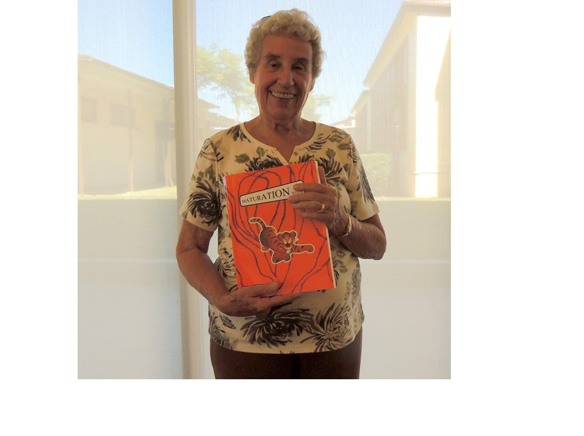Estelle Gibson Lauer had no intentions of writing a book, much less publishing one just a few years ago. But when the alumni department of the University of the Pacific (formerly College of the Pacific) issued an invitation for its graduates to send them printed records of their memories there, Lauer got an idea.
Lauer spoke about her experiences at the Lemon Grove Library’s author talk on Aug. 8.
Estelle Gibson Lauer had no intentions of writing a book, much less publishing one just a few years ago. But when the alumni department of the University of the Pacific (formerly College of the Pacific) issued an invitation for its graduates to send them printed records of their memories there, Lauer got an idea.
Lauer spoke about her experiences at the Lemon Grove Library’s author talk on Aug. 8.
“I’d read some of the other things that people had submitted to the alumni department and thought I could do better. What I read was all sickeningly sweet,” she told the audience.
“You just can’t have 20 kids living in the same dormitory together and love each other all the time,” said Lauer, a Rancho San Diego resident.
So Lauer set to work gathering all the diaries and letters she had written and received from 1951 to 1954, many of them in correspondence with her husband-to-be Ronald Lauer. The end result is a big, bright orange book to dive into, entitled “Maturation Rites.”
However, the book is much more than a collection of diary entries and letters. It is a window inside the political and social landscapes of life in the 50s.
“When I attended College of the Pacific from 1950 to 1954, it was not only in a different century, it was in a different world,” Lauer wrote as her first sentence in the book.
The girls had no TV in their dorms. There were never any incidences of them getting drunk, at least not in the dorm. There was nothing significant to rebel against except authority, and that’s what the housemother represented to them.
The housemother Mrs. Dillingham, whom she and her friends often called “Dilly” and other names, was a throwback to the Victorian era.
“We were still having tea, all of us wearing high heels and gloves and we all had to talk about how lovely it was. There was to be no mention of boys or politics,” Lauer said, with her trademark laugh.
Everyone in the dorm had a curfew of 10 p.m. Many of the girls would sneak into their room very late at night, their roommates opening the door for them and never mentioning it to the housemother.
Religion played a major factor at College of the Pacific, which was a Methodist school. Two Catholic friends of Lauer’s named Bob and Sue had fallen in love, but when Sue lapsed into Methodism, they just could not reconcile their differences and split up.
Lauer herself had been baptized Episcopalian but religion was not her call. Rather, she had been attracted to COP for the school’s piano player.
“He’d gone to Julliard and I wanted to meet him,” Lauer said.
Though Lauer had no interest in religion, the housemother made it her mission to make sure that “I stayed on the straight and narrow,” Lauer remembered.
In Lauer’s book, there are many references to political figures, such as McCarthy.
“I literally thought that people had to wear “Communist” signs around their neck,” Lauer said, laughing.
Another fact of life of 1950s life was the threat of atomic bomb attacks.
“We had to wear bathing suits under our clothes, so we that we could jump in the pool and survive. Of course, now we know that wouldn’t help at all,” Lauer said.
When she met her husband-to-be Ronald Lauer, they struck up a correspondence through letters when he went off to finish his time in the Marine Corps.
Ronnie, as she called him, read witty accounts of Lauer’s mishaps in her letters to him. She poured out her miseries about her housemother on paper.
“The housemother had made it her mission to keep me on the straight and narrow,” Lauer said. “I had to go to church in the early morning even though I’d get in at 3 a.m. There were times I literally hid from her.”
The audience at the Lemon Grove Library laughed.
“It just goes to show how we age and look at things from our past and find a younger version of ourselves,” said Amanda Heller, the branch librarian.
And what of segregation?
“We didn’t even know what the word racist meant. But we rarely saw anyone else other than Caucasian on campus,” she said.
For women back then, there were only three career tracks that they could take: secretary, nurse or teacher. Lauer opted for being an elementary school teacher. She later became an ESL teacher.
In wrapping up the talk, Barbara Lavinio-Schmitz said that she had read Lauer’s book and loved it because it harks back to her own coming-of-age time.
“We realize how far we’ve come, but we also need to back to some things. There is less prejudice and more opportunities now, but we need those old qualities of innocence,” she said.
Lauer will be speaking at other libraries soon, including Rancho San Diego Library. Call the library at 619-660-5370 for details. For a copy of “Maturation Rites,” contact Lauer at lghistorical@gmail.com.














